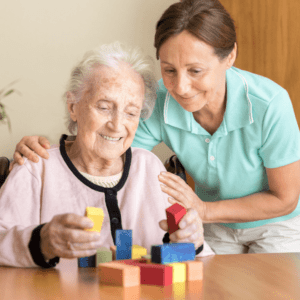
Alternative Treatment Giving Hope to Alzheimer’s Patients
Alzheimer’s is a form of dementia, which in itself is a general term to describe symptoms such as loss of memory, personality shifts and disorientation and confusion.
Dementia is caused by brain diseases which damage the brain’s ability to instruct the body to perform certain tasks. These diseases will be familiar to us as Alzheimer’s (which is the most common), vascular dementia, Lewy Body Dementia and frontotemporal dementia.
What’s more, Dementia is the leading cause of death in the UK, and makes for some shocking statistics:
- Accounting for 12.7% of all deaths in Britain.
- 900,000 people in the UK are suffering from Dementia.
- Projected to grow to 1.5 million by the year 2040.
- 80% of Dementia sufferers have Alzeheimer’s.
- Impacting 1 in every 14 of the population aged 65 and over.
- Early onset Dementia impacting 42,000 people in the UK under the age of 65.
Jean Allen lost her husband Richard ten years ago after he was diagnosed with early onset Alzheimer’s in his late forties in 2004, “he was still very fit and active, so it came as a tremendous shock to us, we certainly weren’t prepared (for the diagnoses),” Says Jean.
“Richard was struggling at work for some time with his concentration and ability to focus,” continues Jean, “it made him very distressed and anxious, which is why he initially went to see the GP.”
Are there Alternative Treatments for Alzheimer’s?
Dr Deborah Lee, a medical writer for Dr Fox Online Pharmacy, worked within the NHS for over thirty years as a qualified GP and Doctor and has seen and read about plenty of cases of Alzheimer’s.
“As a doctor and a GP I know a lot about it and I read and write about it quite often.”
Dr Lee continues, “One of my friends died of early onset dementia aged 63. Another has recently died of Lewy body dementia.”
“Although, sadly, there is no cure for Alzheimer’s Disease, if you or a relative have it, there may be alternative therapies which may help reduce or slow the development of the disease.”
In many cases, if an alternative treatment can help to alleviate some of the symptoms or slow progress, this would be a welcome relief to many families.
Revolutionary Treatment Gives Hopes to Alzheimer’s Patients
A Transcranial Pulse study in Germany has recently reported that 84% of participants in the study are experiencing positive effects post-treatment.
Professor Marc Ziegenbein, a psychiatry and psychotherapy specialist, started the study of 77 subjects with mild to moderate Alzheimer’s disease in 2021.
“Improvements were mainly found in the areas of orientation in the environment, concentration, general well-being and satisfaction. 84% of the subjects surveyed rated their psychological well-being after the TPS treatment as medium to good.” Says Dr.Daniel Clark, who also acts as the TPS treatment manager.

Share this Image On Your Site
What Are the Symptoms of Alzheimer’s?
Although Alzheimer’s symptoms can vary from patient to patient, they will begin to worsen over time, usually over a number of years from initial diagnosis.
Symptoms can be categorised into three subsections depending of severity:
Early Stages
In some cases, particularly in older people the early symptoms are dismissed, as these are often systematic of growing older.
This was similar in Tom Sharpton’s case when his dad Brian was first displaying symptoms, “When my dad Brian first began developing symptoms, such as forgetfulness and confusion, we put it down to his age – at that point he was getting into his early 80s,” says Tom.
“He was an engineer and welder by trade, so he loved to find out how things worked and by the time his symptoms were first developing he was still tinkering with his clocks and model trains.
Of course, looking back, I regret not taking things a bit more seriously at the beginning, a few years later he was no longer the same person that we all knew and loved.” Concludes Tom.
Symptoms typically include:
- Becoming forgetful, especially of recent conversations or events.
- Misplacing items.
- Forgetting names, places or words in sentences.
- Asking repetitive questions.
- Mood swings, such as anxiety and anger.
Middle Stage
Sonia Short, Founder & CEO of Wrist-Assured, began her business after a close family member wandered off during the middle stages of dementia.
As Sonia explains, “We had an aunt living with dementia who went to the bank with her
husband. As often happens when dementia progresses, her confusion kicked and she told one of the staff that she didn’t know her husband.
“They were briefly separated whilst the matter was cleared up but unfortunately in the few moments it took to get the situation sorted, she wandered out of the Bank, and she wasn’t found again until many hours later.”
- Increased confusion and disorientation.
- Impulsive, and often reckless behaviour.
- Spells of delusion, paranoia and suspicions of others (particularly carers and family members they do not recognise).
- Problems with speech and language.
- Restless sleep and difficulty relaxing.
- Further mood swings.
- Hallucinations.
Later Stages
As the disease progresses to the later stage, symptoms become increasingly severe, and is not only incredibly distressing for the person suffering, but also for their carers, friends and family too.
As Jean explains in her husband Richard’s case, “early onset Alzheimer’s developed quite quickly in Richard’s case, and although he lived for another nine years after his diagnoses, the last few years especially were tremendously difficult, his quality of life had deteriorated considerably.”
“Richard was still in his 50’s when he came to the end of his life, and if he got agitated or suspicious of us, he could get very aggressive, to the point of physical violence, which caused a good deal of pain for almost all of us at one point or another as he was still quite strong,” says Jean “this on top of his around the clock care needs meant we found it hard to manage as a family.”
Tom Sharpton says, “After his initial diagnosis, aged 83, only a few years went by by the time he needed more specialist care and he is now well cared for in a home.”
By the time a person reaches this stage, the severity of the symptoms will probably mean the person will require full time care, when/if they begin struggling with the following:
- Difficulty in eating and swallowing.
- Difficulty with physical movement.
- Incontinence.
- Degradation of both short and long term memory.
- Loss of speech.







